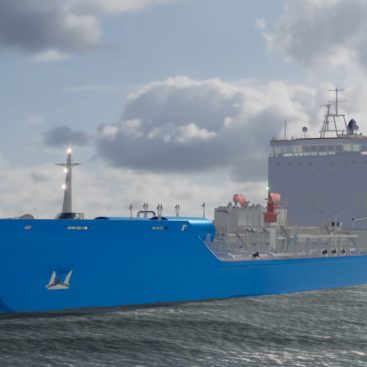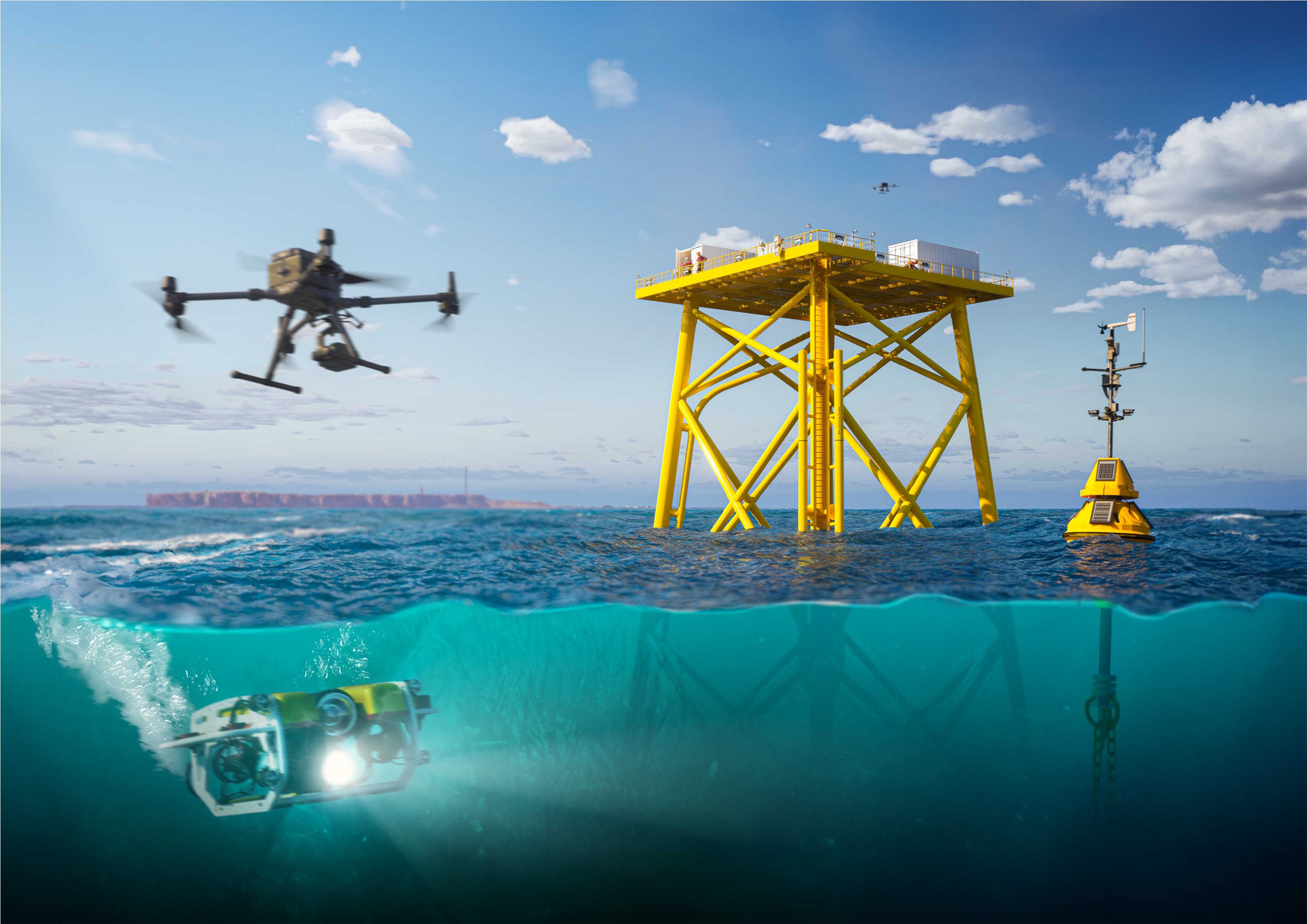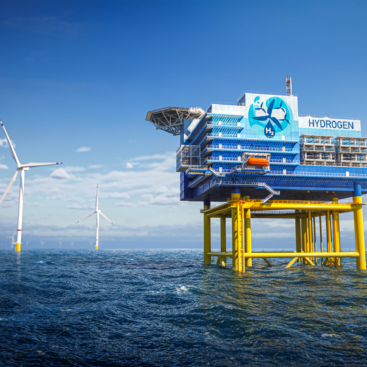AquaDuctus
 View Work
View Work

On October 22, 2024, the Federal Network Agency approved the hydrogen core network. The hydrogen core network has a total length of 9,040 kilometers. AquaDuctus is the only pipeline project planned for the German North Sea, which also includes a further 100 kilometers on land. As a central component of the hydrogen core network, AquaDuctus forms the heart of an integrated European offshore hydrogen infrastructure.
As the “open access” pipeline, AquaDuctus will be a central project for the development of a sustainable hydrogen infrastructure in Germany and for Europe. As part of the AquaVentus initiative, it will form the heart of a future hydrogen pipeline infrastructure in the North Sea.
With its transport capacity of 20 gigawatts, the pipeline offers the opportunity to feed green hydrogen produced offshore directly into the hydrogen core network or the European Hydrogen Backbone. As an IPCEI-notified project (“important project of common European interest”), it will integrate not only Germany, but also countries such as the Netherlands, Belgium, Denmark, the United Kingdom and Norway into a networked European offshore hydrogen pipeline system.
The aim of AquaDuctus is to efficiently transport hydrogen produced offshore from wind farms, including areas such as the German SEN zones, to the mainland. Demand centers, e.g. industrial production sites, and hydrogen storage facilities in Germany and other European member states can thus be served. The German offshore pipeline is essential to drive decarbonization, diversify energy sources and achieve the climate targets of Germany and the EU.
In view of its great potential to promote the integration of renewable energies, strengthen competition on the energy market and increase security of supply, AquaDuctus has logically been confirmed as a project of common interest (PCI) by the European Commission. This recognition establishes the project as a cornerstone of the future European hydrogen economy and sustainably strengthens the integration and stability of the energy market in the EU.
The AquaVentus initiative aims to achieve its ambitious goals with the help of the projects’ pioneering technical work. In the long term, however, integration into a European hydrogen network is also one of the plans of the AquaVentus project family.
 View Work
View Work
 View Work
View Work
 View Work
View Work
 View Work
View Work
More than 100 companies, research institutions and organizations along the entire value chain are members of the AquaVentus Association.
Renewing the world with energy Statkraft is an international leader...
Shuangliang Clyde Bergemann GmbH has extensive experience with air-cooled condensers...
ABL is a leading global independent energy and marine consultant...
Who is Accelera? – We’re a clean energy technology brand...
The joint-stock company “EMS” is a maritime service provider that...
The Department of Economic Development is the regional contact point...
AUCOTEC AG, founded in 1985, develops engineering software for the...
Wind has enormous power. Wind energy has long made an...
Our company has been around since 1981. It all started...
BOGE KOMPRESSOREN is a manufacturer of industrial compressors and compressed...
Bosch, a leading global technology and services company, was founded...
We are an international energy subcontractor with a wide reach...
BIS Bremerhavener Gesellschaft für Investitionsförderung und Stadtentwicklung mbH is responsible...
The Buckstay Group is an expanding consultancy that provides large...
Founded in 1828, Bureau Veritas is a global leader in...
In 1975, our company founder Jan Brand made his technical...
Brunsbüttel Ports owns and operates the Brunsbüttel port group (Elbehafen,...
Electricity, natural gas and heat. Renewable energies, hydrogen, electromobility, energy...
McDermott has a fleet of derrick barges, construction and pipe-laying...
Continental develops pioneering technologies and services for sustainable and connected...
Many years of experience, extensive capacities and its prime location...
Copenhagen Energy Islands (CEI) is a new company dedicated to...
Climate change, energy transition 2.0, security of supply – our...
We keep Europe moving through a wide range of freight...
DWV is committed to the protection of our nature and...
For 30 years, the DFKI has been combining scientific excellence...
DNV operates in more than 100 countries as an independent...
EBRO ARMATUREN, headquartered in Hagen, Germany, is one of the...
EnBW Energie Baden-Württemberg AG supplies around 5.5 million customers with...
EnTec Industrial Services GmbH & Co KG was founded in...
Elogen is the French leader in proton exchange membrane (PEM)...
One of the essential prerequisites for the prosperity of a...
Headquartered in Belgium, Fluxys is a fully independent energy infrastructure...
For more than 50 years, ERM has been advising the...
FutureOn is a company with truly revolutionary technology that addresses...
Fraunhofer IFAM is one of the most important independent research...
GASCADE is a German long-distance gas network operator based in...
Our mission is to transport gas safely, reliably, and economically....
The German Aerospace Center is the research center of the...
Well equipped for the future: German LNG Terminal is planning...
GÖRG is one of the top independent commercial law firms...
On September 1, 1945 Wilhelm and Marie Harting founded the...
Since 1919, the name Hansen & Rosenthal has stood for...
The name HC HAGEMANN stands for one of the oldest...
With 1,700 employees, the HanseWerk Group is one of the...
As an innovative hydraulic engineering company, we are active nationally...
As an emission-free alternative to petroleum, green hydrogen is a...
Founded in 1968, HYTORC is the world’s leading brand for...
HydePoint is the future of offshore hydrogen production, efficiently harnessing...
EDF Renewables Deutschland develops, builds and operates projects in onshore...
We support companies in expanding their competitive advantage and promoting...
INP International Projects is an owner-managed engineering company with its...
Jörss – Blunck – Ordemann GmbH is a planning and...
J-POWER is Japan’s sixth largest electricity producer, owning and operating...
Focused expertise on insulating flanges: ISOFLANGES – A NEWCOMER WITH...
The Iberdrola Group occupies a leading position internationally in the...
The Institut für Klimaschutz, Energie und Mobilität (Institute for Climate...
At the beginning of the 1970s, Kremsmueller established itself in...
The Gesellschaft für Energie und Klimaschutz Schleswig-Holstein GmbH (EKSH) promotes...
Who are we? Latent Drive is at the forefront of...
Lhyfe is a producer and supplier of green hydrogen. Founded...
LRQA is a spin-off of the maritime classification society Lloyd’s...
Mabanaft is a leading independent and integrated energy company that...
Mannesmann Line Pipe is a leading specialist in HFI longitudinally...
Mannesmann Grossrohr GmbH is a wholly owned subsidiary of Salzgitter...
Natixis -Your “Go-To” Bank in Energy and Natural Resources: Natixis...
N-Sea is the leading provider of total subsea solutions. We...
We aim to be the leading independent E&P company by...
NGT is a Dutch company that has owned and operated...
NOGAT B.V. is the owner and operator of the NOGAT...
As a group of pioneers of offshore wind energy, we...
OneSubsea provides integrated solutions, products, systems and services for the...
In 2001, the shareholders of OWT recognized the developing market...
Heligoland belongs to the district of Pinneberg and thus to...
Ørsted vision is a world that runs entirely on green...
Parkwind N.V. is a Belgian company founded in 2012 with...
Ramboll is an international engineering, architecture and management consultancy founded...
With our motivated employees, we aim to create the ultimate...
Rosenxt ist ein zukunftsorientierter Technologiekonzern – wir sind visionäre Architekten...
Roxtec was founded in 1990 by Mikael Blomqvist in his...
Subsea 7 is a leading global provider of offshore projects...
The generation of electricity from renewable energy sources is bundled...
Our mission at Siemens Energy is to enable our customers...
Shell is a global group of companies that provides solutions...
SOBIS Software is a German company focused on Project Collaboration...
The Stablegrid Group initiates, supports and implements a wide range...
The STIFTUNG OFFSHORE-WINDENERGIE was established in 2005 to promote environmental...
The energy transition is the biggest challenge facing the Netherlands....
Your project is our project. This is a short and...
THIELE was founded more than 85 years ago and is...
With our knowledge, we stand for safety, independence and quality...
Safety and quality in almost all areas of business and...
With more than 25,000 employees in around 50 countries, TÜV...
TotalEnergies is a global multi-energy company that produces and markets...
Vattenfall conducts research and development and technology-based innovation to provide...
Van Oord’s extensive specialized fleet of vessels is a testament...
VERBUND is Austria’s leading energy company and one of the...
Virya Energy is a holding company engaged in the development,...
Weidmüller – a partner for Industrial Connectivity The Weidmüller Group...
You need to load content from reCAPTCHA to submit the form. Please note that doing so will share data with third-party providers.
More Information